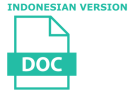Kebutuhan Kompetensi Soft Skill Lulusan Program Studi Bahasa/ Sastra Jepang di Dunia Kerja
Wury Dwiwardani(1*), Lufi Wahidati(2)
(1) Universitas Gadjah Mada
(2) Universitas Gajdah Mada
(*) Corresponding Author
Abstract
One of the efforts to improve the quality of human resources is by building links and matches between educational institutions and industry. This link and match will support the growth of skilled human resources who can contribute optimally in various fields. In this regard, the question that often arises is whether universities, as institutions that play a role in educating young people, have produced graduates who have competencies that are in line with the needs of the industries. This research was conducted to identify hard skills and soft skill s typically required by the industries related to Japan and needed to be mastered by the graduates of Japanese Language/Literature Study Program who are working as Japanese speaking professional. Besides, this research aimed to analyze the weaknesses and problems faced by Japanese speaking professional when carrying out their work. The research data were collected from Japanese speaking professionals and the representative from Japanese companies located in Indonesia using questionnaires and interviews. Data obtained were then analyzed by referring to several references, including the results of the research conducted by M.M. Robles (2012) related to hard skills and soft skill s. The study finding about the strengths and weaknesses of Japanese Language Study Program graduates in Indonesia, can lead to improvement of the Japanese language learning, especially Japanese language learning in universities in Indonesia. So that the results of the study are expected to be taken into consideration in preparing and developing the curriculum of Japanese Language Studies Program in Universities, not only in the Vocational School of UGM, but also in other institutions in Indonesia.
Keywords
Full Text:
PDFReferences
Ekspor dan Investasi, Kunci Pertumbuhan Ekonomi Negara. (2017, October 25). Retrieved March 3, 2018 from http://presidenri.go.id/berita-aktual/ekspor-dan-investasi-kunci-pertumbuhan-ekonomi-negara.html
Japan Association of Corporate Excecutive. (2016). Korekara no Kigyou-Shakai ga Motomeru Jinzaizou to Daigaku he no Kitai. Retrieved March 5, 2016 from www.jasso.go.jp/gakusei/career/event/workshop/__icsFiles/afieldfile/2016/04/28/3H27WS_keizaidouyukai.pdf (in Japanese)
Laporan 3 Tahun Pemerintahan Joko Widodo-Jusuf Kalla. (2017, October 17). Retrieved March 3, 2016 from http://ksp.go.id/wp-content/uploads/2017/10/LAPORAN-3-TAHUN.pdf.
Strategi Cerdas Mengelola Ekonomi dan Investasi. (2016, May 7). Retrieved March 3, 2018 from http://presidenri.go.id/berita-aktual/strategi-cerdas-mengelola-ekonomi-dan-investasi.html
Article Metrics
Refbacks
- There are currently no refbacks.
Copyright (c) 2019 The Author(s)

This work is licensed under a Creative Commons Attribution-ShareAlike 4.0 International License.







